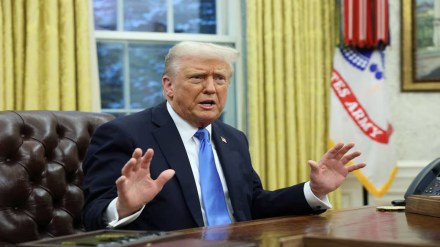U.S. President Donald Trump confirmed on Wednesday that he authorized the Central Intelligence Agency to conduct covert operations in Venezuela, marking a sharp escalation in U.S. efforts to pressure President Nicolas Maduro’s government.
The New York Times first reported the classified directive, citing U.S. officials familiar with the decision, saying the Trump administration’s Venezuela strategy aims to remove Maduro from power. The administration has offered $50 million for information leading to Maduro’s arrest and conviction on drug trafficking charges.
The new authority would allow the CIA to carry out lethal operations in Venezuela and conduct a range of operations in the Caribbean, the Times reported.
Asked why he authorized the CIA to operate in Venezuela, Trump told reporters his reasons were migration of Venezuelans to the United States and drug trafficking.
“I authorized for two reasons really,” Trump said. “Number one, they have emptied their prisons into the United States of America…they came in through the border. They came in because we had an open border,” he told reporters in the Oval Office. “And the other thing are drugs,” Trump said.
Trump has not provided evidence for his claim that Venezuela is sending former prisoners to the U.S.
He added that the U.S. has made progress intercepting drug shipments at sea, and that additional efforts are now focused on overland routes.
“We are looking at land now, because we’ve got the sea very well under control,” Trump said.
Reuters could not independently determine what specific actions Trump has authorized and the White House declined to elaborate on the president’s comments.
Historically, the agency’s involvement in such operations has varied widely from direct paramilitary engagement to intelligence gathering and support roles with little to no physical footprint.
The CIA has a long history of operations in Latin America, particularly during the Cold War, and helped topple South America’s cocaine trafficking empires at the end of the 20th century. Reuters has reported that the CIA has been running covert operations in Mexico for years to track down the country’s most-wanted drug traffickers.
Venezuela’s government said Trump’s remarks constituted a violation of international law and said U.S. actions were aimed at legitimizing a “regime change” operation with the goal of seizing the country’s oil resources.
“Our Permanent Mission to the UN will raise this complaint with the Security Council and the Secretary-General tomorrow, demanding accountability from the United States government,” Venezuela said in a statement released by Foreign Minister Yvan Gil on his Telegram account.
Trump: Venezuela ‘feeling heat’
Trump has repeatedly accused Venezuela of being a hub for trafficking of the deadly drug fentanyl, but U.S. records have shown that Mexico is the main source of fentanyl.
Trump was asked by a reporter why he did not have the Coast Guard stop suspected drug trafficking boats, which has been U.S. practice for decades. Trump called such efforts “politically correct” and said they had not worked.
Trump declined to answer when asked if the CIA has the authority to execute Maduro, saying: “I think Venezuela is feeling heat.”
Trump has ordered a large U.S. military buildup in the southern Caribbean, and the troops have conducted at least five strikes on vessels the Trump administration has described as involved in drug trafficking, without providing evidence.
The campaign is the most recent example of Trump’s efforts to use U.S. military power in new, and often legally contentious, ways, from deploying active-duty U.S. troops in Los Angeles to carrying out counterterrorism strikes against drug trafficking suspects.
The Pentagon recently disclosed to Congress that Trump has determined the United States is engaged in “a non-international armed conflict” with drug cartels.
Trump: Venezuela released prisoners into US
Trump also accused Venezuela of releasing large numbers of prisoners, including individuals from mental health facilities, into the United States, although he did not specify which border they were crossing.
Neither Maduro’s Information Ministry nor press representatives for opposition leader Maria Corina Machado immediately responded to requests for comment on Trump’s remarks.
The Trump administration has provided scant information about the strikes, frustrating members of Congress, including some of his fellow Republicans.
On Wednesday, Senator Jeanne Shaheen, the top Democrat on the Senate Foreign Relations Committee, said the administration moved the U.S. closer to outright conflict.
“The American people deserve to know if the Administration is leading the U.S. into another conflict, putting service members at risk or pursuing a regime-change operation,” she said in a statement.
